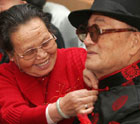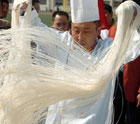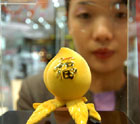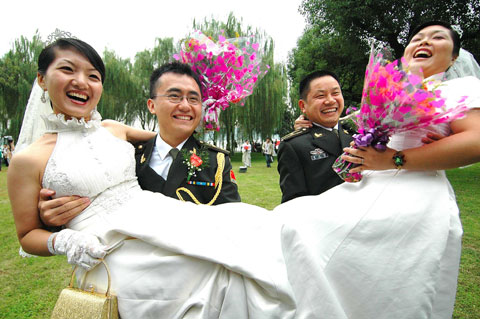With the country's most important political event round the corner, the focus is on the decisions the Communist Party of China (CPC) is likely to take on the role of non-CPC members in post-reform society. The 17th CPC Congress has generated special interest because of the appointments of two non-CPC members as ministers recently. That has brought multi-party cooperation to the fore, too.
France-trained scientist Chen Zhu was named health minister at the end of June. The 54-year-old replaced Gao Qiang, who is now deputy minister and secretary to the ministerial CPC organ. Gao took over the reins of the ministry in 2003, especially to tackle the SARS outbreak.
Unlike Chen, minister of science and technology Wan Gang, appointed in April, is a member of China Zhi Gong (Public Interest) Party. The 55-year-old was with Audi Corporation in Germany as an automobile engineer before taking over as president of Tongji University in Shanghai.
|
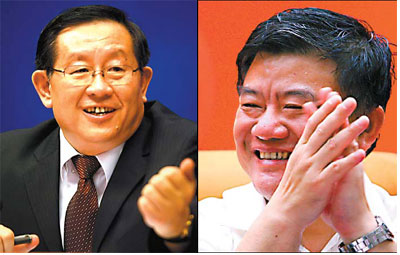
The appointment of Minister of Science and Technology Wan Gang (left) and Minister of Health Chen Zhu has brought multi-party cooperation to the fore.
|
Their appointments have generated so much interest because they are the first non-CPC member ministers since the late 1970s. Political observers see that as CPC's determination to ensure the best brains in the business, irrespective of their ideological inclinations, head the administrative posts. It seems, the reform that started with the economy and social sectors is embracing politics, too.
"Their appointments show the trust the CPC Central Committee has in non-CPC members." an official with the United Front Work Department (UFWD) of the CPC Central Committee says. The practice of appointing people from outside the CPC as ministers is not new. In fact, the first cabinet of the People's Republic of China had 15 non-CPC ministers. From the late 1950s to the mid-1970s, however, the appointees were exclusively from within the CPC.
But multi-party cooperation and consultation has always been part of CPC's fundamental policies to ensure better governance.
Song Fufan, an expert with CPC Central Committee School, says the reforms and opening-up have given rise to more social categories. "And the CPC has risen up to the challenge by not only becoming more tolerant towards non-CPC leaders and experts, but also being eager to absorb them in administrative jobs," Song says.
In recent years, the CPC Central Committee has issued a series of directives and recommendations to appoint non-CPC members to political posts. In 2005, it ordered all local governments and departments at and above the county level to open up top jobs to non-CPC members.
The Party leadership also wants the State Council, the country's highest administrative body, to pay special attention to appointment of non-CPC members to ministerial or equivalent posts.
The UFWD official says the move will help implement and improve the multi-party cooperation and political consultation system. "It's also a strategic step in pushing forward the development of socialist political democracy."
The case of the two new ministers is similar. Chen and Wan both enjoy some advantages because of their professional achievements and administrative experiences, says Shanghai Social Sciences Association vice-chairman Yin Jizuo.
Chen is known for his achievements in clinical and molecular studies for the treatment of acute promyelocytic leukemia. As vice-president of China's top science think tank Chinese Academy of Sciences, he has made great efforts to develop life science and biotechnology in the country.
Wan's contributions to technological innovations, on the other hand, are said to have helped Audi Corporation achieve outstanding financial results. On his return from Germany, he was in charge of a key national electric vehicle project before taking over as president of Tongji University.
Gifted and brilliant personalities like them, experts say, have more opportunities to become high-ranking officials in China today. "More non-CPC members have the chance to become leaders at State or local government levels because the system of multi-party cooperation and political consultation under the CPC's leadership is strengthening," says Hu Wei, professor of politics in Shanghai Jiao Tong University.
A recent article in the Study Times, published by the Central Party School, says more non-Party members will be promoted to senior positions, especially in areas of administrative and judicial supervision, health and other directly public-related departments, intellectual activities and the professional sector.
Sectors such as science, technology, health and culture that need the leadership of high-level experts are the ideal areas in which non-CPC members can be absorbed, says Song. Chen and Wan may have grabbed the headlines for their high-profile postings, but in the past couple of years thousands of non-Party members have been elected as leaders at different government levels.
In flourishing areas such as Shanghai and Jiangsu, local governments have said the percentage of non-CPC members as department leaders should reach a certain level to ensure multi-party cooperation and political openness in administration. For instance, the municipal government of Nanjing, capital of East China's Jiangsu Province, issued a directive recently saying more than half of its key municipal government divisions should have leaders from outside the CPC.
But appointments like that of Chen and Wan have created a new problem: how to allocate powers of the administrative and party organs within the same ministry.
In an interview after his appointment, Wan said he had gathered some experience in multi-party cooperation because "even at Tongji University, I was one of the very few non-CPC member presidents of an elite Chinese university".
But how is Wan expected to work with the parallel ministerial party organ?
Wan says the ministry is trying to find a way in which the party and the administrative organs can cooperate and yet remain independent of one another. He, however, didn't reveal more details about the new model.
The independent but cooperative functioning of the parallel party and administrative organs remain a key issue, especially with more non-CPC members expected to lead government bureaus.
Some experts say the government could revert to practise followed from 1949 to the late-1950s. The Party organs then used to seek ministers' advice at their meetings. Even though the ministers couldn't vote during the meetings, their advice was highly appreciated and always taken into consideration, say experts.
Resolving the issue shouldn't be a major problem for the CPC and the government, says Song, because the country is heading towards multi-party cooperation under CPC's leadership.
Xinhua contributed to the story
(China Daily 08/02/2007 page12)







